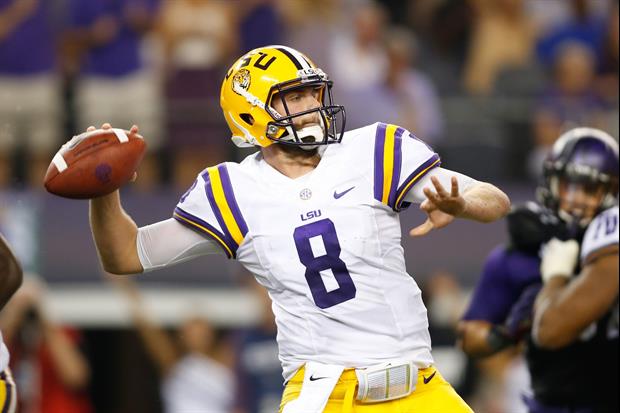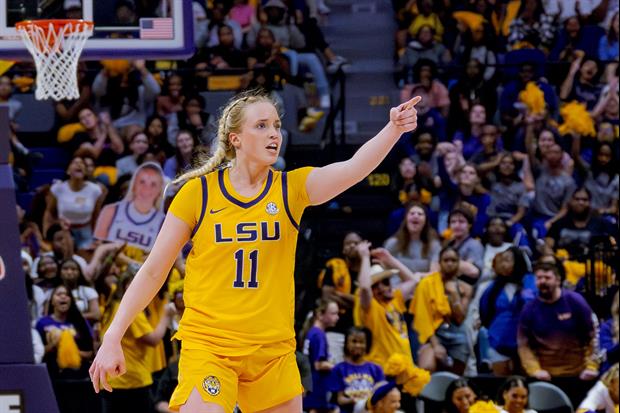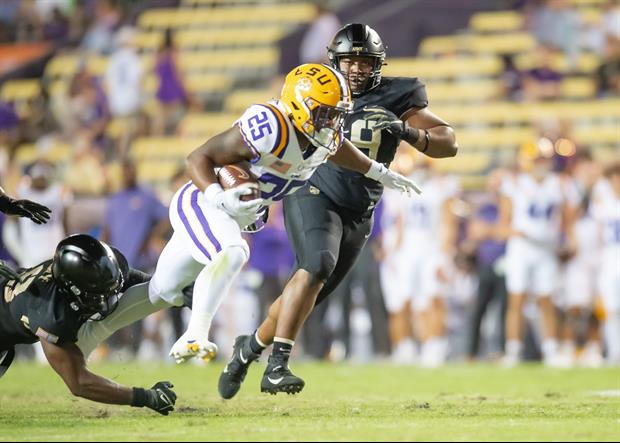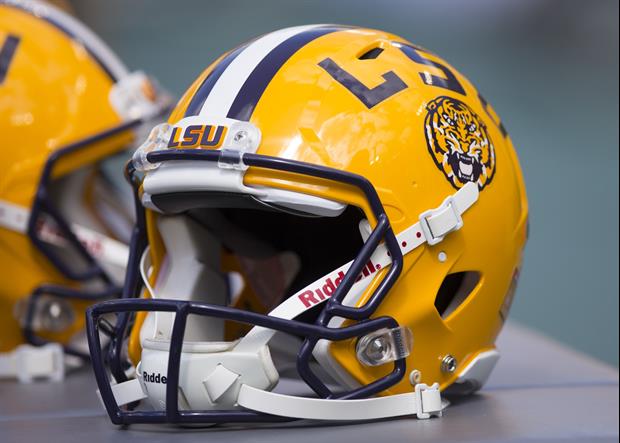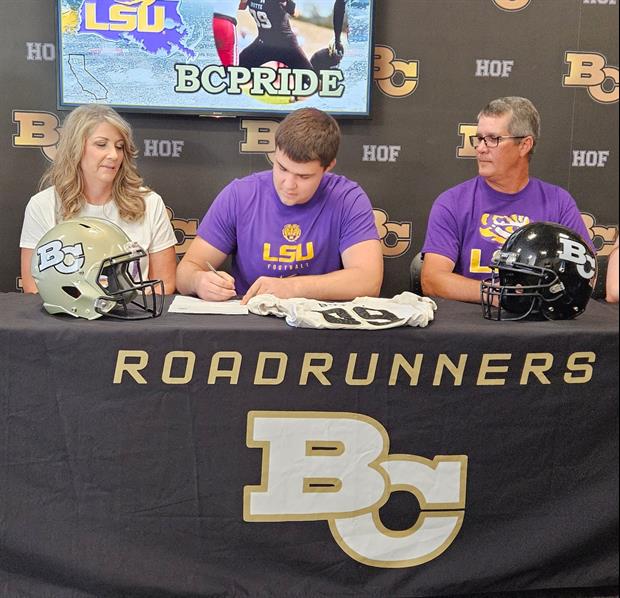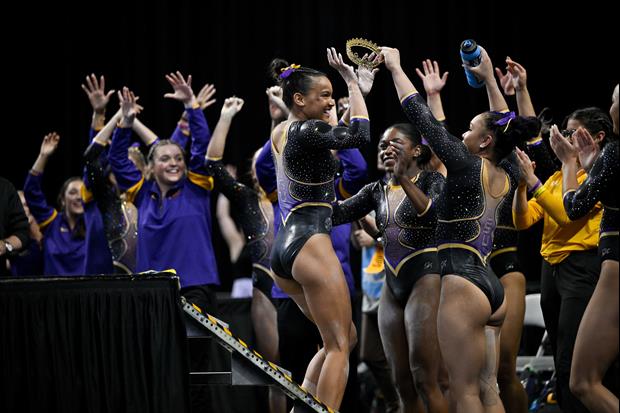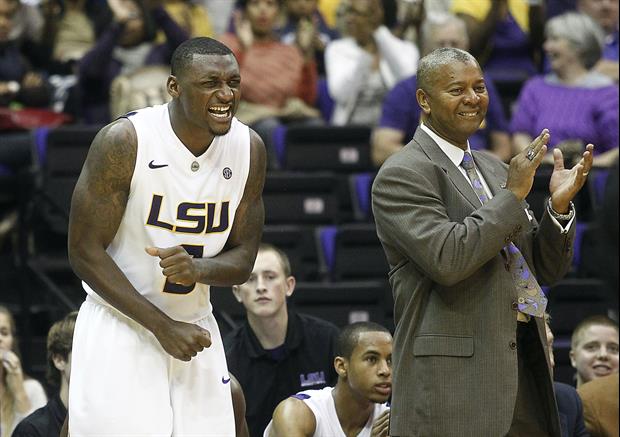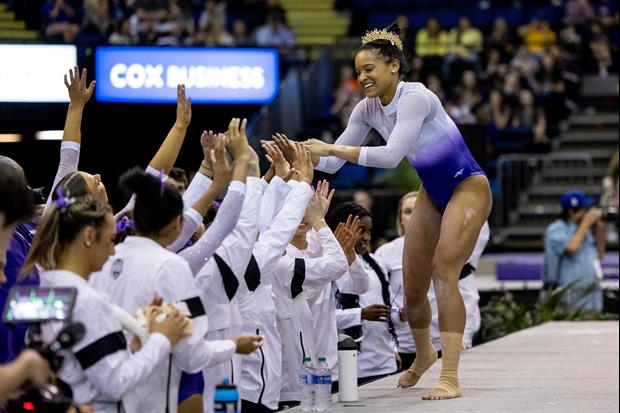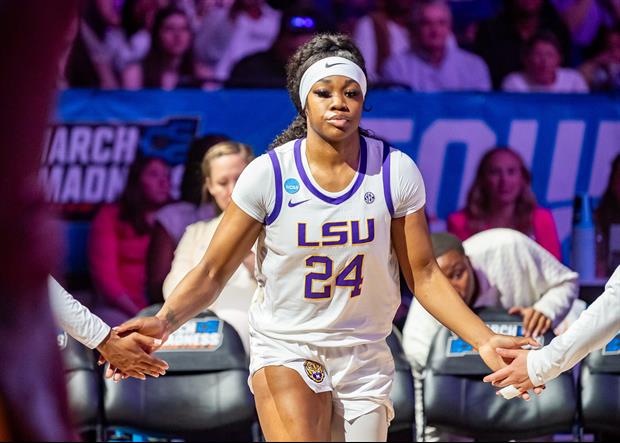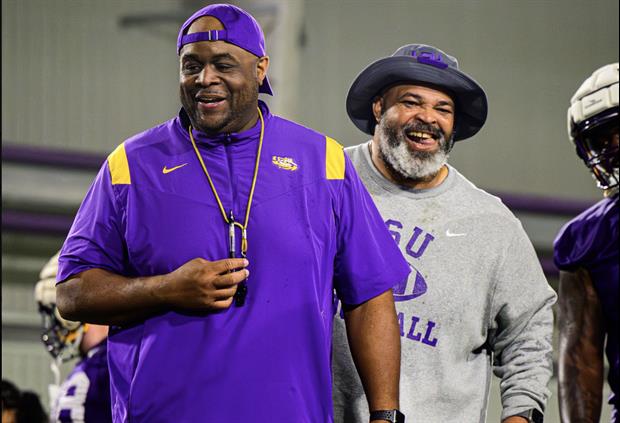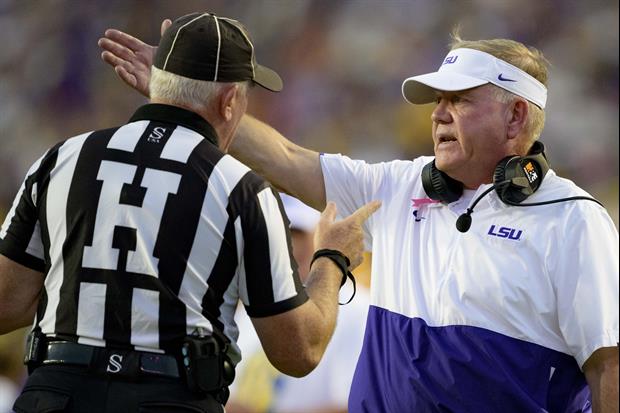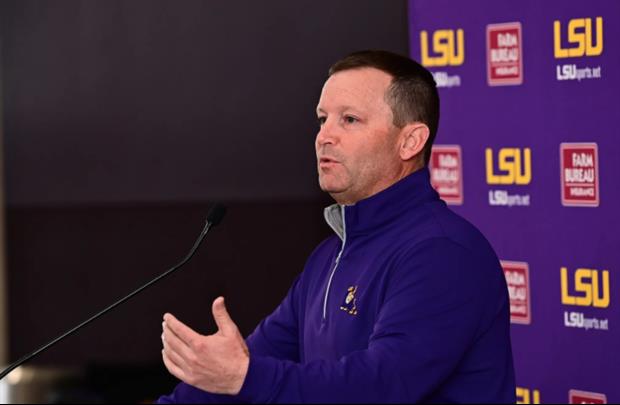- My Forums
- Tiger Rant
- LSU Recruiting
- SEC Rant
- Saints Talk
- Pelicans Talk
- More Sports Board
- Fantasy Sports
- Golf Board
- Soccer Board
- O-T Lounge
- Tech Board
- Home/Garden Board
- Outdoor Board
- Health/Fitness Board
- Movie/TV Board
- Book Board
- Music Board
- Political Talk
- Money Talk
- Fark Board
- Gaming Board
- Travel Board
- Food/Drink Board
- Ticket Exchange
- TD Help Board
Customize My Forums- View All Forums
- Topic Sort Options
- Trending Topics
- Recent Topics
- Active Topics
Q&A From Jay Johnson's Introductory Press Conference
by Staff Reporter
June 29, 20210 Comments
Following Jay Johnson's opening statement at his press conference on Monday, the new LSU coach answered questions from the media. Here's the full transcript:
Q. Coach, how quickly do you expect to name a staff? How far along are you on that?
JAY JOHNSON: Yes, absolutely. Working very diligently with that. I will not sacrifice time to make sure we have the right people. The most important people in influencing the players that we all want to play great, be great students and be great people is the coaching staff, and we spend more time with them than their own families, so I'm working diligently.
I'm talking to a lot of people. It is not a narrow search because it's too important to get that right. We need a staff that can recruit at an elite level, meaning evaluating talent, evaluating players that are worthy of playing on this field, that have the makeup, character and ability to do that and do it in a way that's going to help us win championships, and that's a skill that has to be developed.
And then from a development standpoint, finding a pitching coach, finding an assistant hitting coach that they want to put their trust in to be developed so check achieve their dream of being a Major League player, and while they're on their way to being a Major League player, they're helping LSU to win a lot of baseball games. We're working as fast as we can to get the right person.
Q. You mentioned you've talked to a couple of the players already that are on this team. I'm curious what your impressions are of the roster that you've inherited and just the relationships you're already starting to build with these players.
JAY JOHNSON: That's a great question. This is LSU. This is the place in college baseball. I've viewed LSU as college baseball. So it's exciting either way.
Scott mentioned the previous stops that I went, and at the time all of those were rebuilds. I look at this as a reboot. I say that because Paul and his staff did a really nice job of bringing in talent. I think it's talent that we're going to work hard to try to help them to play as good as they can.
I'm excited about that. I've watched some video over the past week or five days, whatever it's been, and we're starting a process of communicating some things with those players that we want them to do better and give them a blueprint to improve and to get better at.
It starts there, and the only way you start to do that is by building trust, developing relationships, and if you're going to win and win quickly, you need immediate buy-in. So we've started that process.
I'd be lying if I said, hey, I know I have the trust of every player in that locker room. I don't because I've only looked one of them in the eye face to face at this point in time, but I can't wait to do that because if we can build that, then there's talent, and then now that talent becomes usable skill.
I think there is talent that if we can just get the usable skill to be a little bit better, then they can really be successful.
Q. You obviously watched LSU for a long time and viewed it as one of the best jobs in college baseball, but you're a West Coast lifer. When it comes to this decision, when Scott offered you the job, how difficult was it for you to leave that area of the country and come to a place that you might not be familiar with?
JAY JOHNSON: Great question. I'll use the word difficulty. The difficulty is in relationships with players. That's what matters to me. I left a team that accomplished a lot of things, and they did it with, as I said, great fundamentals, a competitive attitude and were great people and character. So the difficulty was leaving that team.
That's exactly why I feel like I'm right for a place like this, because I do invest in the players and I do invest in the relationships and I invest in their process to be good. That's the only difficulty.
The rest of it is, let's go. There was probably one place in the country that it was a let's-go attitude. We're standing here right now. In that degree, it was not difficult at all.
Q. I read when you were at Point Loma you wrote down a goal of getting to Idaho for the Junior College World Series and also Omaha some day. How did you figure you would get to this point? And you were at a program that has a great tradition, Arizona. How did you get to this point and figure this would be the ultimate point for you in your career?
JAY JOHNSON: I'm going to use your word. I just view this as the ultimate. You can thank these two men right there for that. You know, it was a great place that I was at, and what made it great was the people. But this is the opportunity of my lifetime.
A lot of people will look at it and go, wait, why did you do that, what are you doing, you are a West Coast guy. That's comfortable. That's not what I'm about. You stare down the challenge of that, you figure out how to put the pieces in place to be successful, and then we're going for it.
I've been going for it for three or four days now. This press conference almost feels late. I'm knee deep into this thing and there's no other way I would have it.
I think it's more excitement and the challenge than anything else because these two men did a heck of a job and left as good as legacy as you possibly can, and so what an opportunity to have a chance to contribute to that.
Q. You may have just addressed it, but the challenge, and you said staring it in the face a couple times. You came from a program that had a nice tradition. It's a voracious fan base here. How have you adjusted your game, I guess, to be the encompassing total coach that is required of a premier job like this?
JAY JOHNSON: That's a great question. You mentioned the fan base. That's another reason I wanted to come. I want passionate people that want to achieve elite things around me. So when I mention our team, the fans are a part of that.
With that being said, we're going to take the best parts of that. There's only a handful of programs around the country that you can count where this many people show up at a college baseball game, and what I want to do, what I think it is important that we do, is create the best home-field advantage in college baseball, and I've heard that's what we have here, and then put a product on the field that they're extremely proud of, that when the Tigers show up, they know what they're going to get. They can't wait to get to the ballpark after a long day of work and they can't wait to high-five the players down the line after a big win, and they can't wait to send their kids to baseball camp because they feel like they're a part of this thing.
For me, I only see that as a positive.
Q. With all the success you had recruiting out on the West Coast, how do you translate that here in the South where the competition is a little more fierce in the SEC?
JAY JOHNSON: Awareness. We just got done playing Vanderbilt in the College World Series. We just got done playing Ole Miss in the super regional. Both of those teams had a significant amount of players from the West Coast that were key players at key positions.
I can add to that. That's something that we can bring to LSU, and my connections and contacts will do that.
With that being said, I'm working on a well-rounded staff that can cut into the recruiting at other places, that can be as fierce, as competitive, as you said, to not just win or not just win recruiting battles because of our logo or because of our resources but because they know what they're going to get when they come play in our program. So by putting it together that way, I think it gives us a great chance with all the things that we have to put us right where we all want to be.
Q. You take over and there's sort of a little bit of time before transfer portal stuff and the Major League draft coming up, which is obviously a huge event for college baseball, as well. What's sort of your plan over the next few weeks and how you intend to approach all that happening in a very short period of time when you're still setting up your staff?
JAY JOHNSON: Yeah. You go. So what does that look like? It's announced, contract signed. I got on the phone. I got on the phone, reached out to the roster. I don't have a ton of answers or all of the answers for those guys at this point in time, but start to develop a foundation and relationship of trust.
July 1st relative to the transfer portal, I want to be fair. I want to give players an opportunity to figure out what is the best opportunity for them.
There's been a lot of communication, figuring out scholarships, roster, all of those types of things. I've spent a lot of time in doing that. The staff right now is important. It allows me to go slow with it because I need to focus on the players. If we're going to get to the College World Series, if we're going to win a national championship, it's because of the players and the roster, so I'm spending 24 hours a day managing that at this point in time, and it's exciting. It's a really good challenge.
Like I said, there's really good players that are in this program right now that have the opportunity to improve, and something that I've always really wanted to see out of the players in our program is that their second year, you see improvement. Their third year, you see improvement, and at a place like this, some of them are going to be ready to go to professional baseball after that.
Another thing I love about LSU, and Paul has done a great job of this, and I'm secure Skip did the same, is because this is so special, those guys will want to come back for another year, a fourth year, because Minor League baseball -- this isn't Minor League baseball, this is the Yankee Stadium of college baseball.
I've talked to some of them, I had a face-to-face meeting with a player last night at 11:00 at night, and he was driving by the stadium and I happened to call him and said, why don't you come by. A player that's really struggling with hey, do I go now, do I stay.
That's because of what we have here. And then we started talking about the things that we could potentially do to help him create value for himself, and not to just sign a pro contract but be ready, really be ready when he goes and achieves that dream.
There's a lot of moving pieces to that because you're only allowed to have so many players, give so many scholarships and put together the right team. We're working through that, and then we'll get to staffing, and then we'll have a really good plan in place once all the hay is in the barn and we know what the roster looks like exactly, and then we're going to do to work.
Q. Obviously we're a little early on for technical decisions and stuff like that, but for example whether you plan to coach from the dugout or as a base coach. How many of those kind of decisions have you made, and if not when and how do they get made?
JAY JOHNSON: Yeah, I will coach from the dugout most likely. I've coached third base every year of my career until this year, and then three games into the season I made the decision to move in the dugout because that was best for that team. I think that's where I would lean right now, but that'll also be dictated by the personnel on the coaching staff and putting those guys in the best position to positively affect the players on game day.
Haven't made it, but that would be what I would lean towards, hire a hitting coach or assistant hitting coach with me that is really good at what they do in one-on-one work with the players, hire a pitching coach that has significant experience at this level and has experience at a level that these players want to go, one or the other.
You'd be really impressed at the amount of coaching talent that wants to come to LSU. I've had a lot of new best friends over the past five days. (Laughter.)
Q. Is it Oroville?
JAY JOHNSON: Oroville.
Q. I get a big grinder vibe from you, that you really like to get after it nonstop. Is that what you were speaking about when you talked about your father? Is that what you got kind of growing up in Oroville?
JAY JOHNSON: Very blue-collar place for sure, but I was a 5'7", 165-pound running back that thought I was going to win the Heisman Trophy someday. Then I realized that wasn't going to be done on talent alone, and so that's just who I am. It's what's required to win at a place like this.
It's a beautiful place. It can really catch your eye, and we're going to really use that in recruiting, and it matters to young people nowadays.
And then when we step out on that field, I want it to be a completely different attitude, and with that it's great fundamentals, highest level of competitiveness, and what that means is no program can value winning and what it takes to win more than the LSU Tigers, and that doing that with the right mindset with the right players, now you can start accomplishing the things that everybody wants to accomplish. But it does not happen unless those things are in place.
So yeah, that's where I came from.
Q. I watched your series against Ole Miss. I don't know what's in the Francona center, but the assets that you have available now, the tops, the physical assets that you have here, was that intriguing? Was that enticing about coming and being a part of this program?
JAY JOHNSON: Yes, absolutely. With that being said, recruiting -- when I walked through that blueprint of recruiting, developing, focusing on what's important now and then repeating that, the development part is the most important part of that, if you have the right people in your organization. If you have the right people in your organization.
The things that we have available to us to put the right people in our organization are very enticing, and it's very exciting. It's shaping how I want to go about putting our staff together relative to when you're at an NAIA school, when you're at two mid-major programs, you've really got to learn how to sell. You've really got to learn how to sell and make the player understand why they need to play for your program.
Then getting a chance to move to Arizona, a little better. A little better, but they were in eighth place for a couple years in a row, and we needed to get players, and it wasn't their first choice for players in the Pac-12, so that happened, as well.
Then you start to have success, you go to Omaha, you're a base hit away from winning a national championship, now it starts to become a little more enticing.
For me, it's about putting the pieces in place for recruits to understand, yes, you have all of this. Yes, it really catches your eye. Yes, it is special. I want them to feel what it's like to be out on that field if a recruit comes and watches a game and goes, there's no place in the country I'm going to go other than that because that's what I want. I want all that to be in place, and then I want them also to say like I want to go place for those guys. I want to entrust those guys with my development.
Q. Your teams have a long history of being able to hit the ball well, and I'm just curious as to the philosophy that you've developed over your coach career and how you've had so much consistency with your teams in hitting.
JAY JOHNSON: We're asking our players to develop through work ethic, all of those types of things, and as a coach I require the same thing of myself. I'm standing here today because I'm a better coach than I was two or three years ago or five years ago or ten years ago.
When I was hired as an assistant coach at the University of San Diego, I had two jobs: Recruit, get the best players we can, and develop the offense to score as many runs as we possibly can. That was a great laboratory for me to dive into that and say, I want to -- this is my area, so I want my area of the team to be the best part of the team. That was a challenge because we actually had some Major League pitchers on those teams, as well.
But I think in how I dive into running a program now, I was afforded an opportunity to really figure out offensive baseball and then what does your team need to do and what it's rooted in, and I have some very strong beliefs in terms of mechanics, in terms of vision, in terms of at-bats, in terms of what we call moving the offense, and every day of our practice sessions or I call it training sessions is geared towards players improving. So game day shows up and they know exactly what to do, and then our staff is putting them in position to know exactly what's happening, how it's going to happen and what's going to be required of them to execute, to move the offense, to score runs.
Every team is different. In 2016 we led the country in sacrifice bunts. That's how the team was built. This year it wasn't going to happen a lot because somebody was going to walk and somebody was going to hit a double. That's what I think we can do here and incorporate a little bit of everything. Ultimately I want teams to hate to play us, and I think we accomplished that the last couple offensive teams that we had, and that's what I want to do at LSU.
Q. Coach, how quickly do you expect to name a staff? How far along are you on that?
JAY JOHNSON: Yes, absolutely. Working very diligently with that. I will not sacrifice time to make sure we have the right people. The most important people in influencing the players that we all want to play great, be great students and be great people is the coaching staff, and we spend more time with them than their own families, so I'm working diligently.
I'm talking to a lot of people. It is not a narrow search because it's too important to get that right. We need a staff that can recruit at an elite level, meaning evaluating talent, evaluating players that are worthy of playing on this field, that have the makeup, character and ability to do that and do it in a way that's going to help us win championships, and that's a skill that has to be developed.
And then from a development standpoint, finding a pitching coach, finding an assistant hitting coach that they want to put their trust in to be developed so check achieve their dream of being a Major League player, and while they're on their way to being a Major League player, they're helping LSU to win a lot of baseball games. We're working as fast as we can to get the right person.
Q. You mentioned you've talked to a couple of the players already that are on this team. I'm curious what your impressions are of the roster that you've inherited and just the relationships you're already starting to build with these players.
JAY JOHNSON: That's a great question. This is LSU. This is the place in college baseball. I've viewed LSU as college baseball. So it's exciting either way.
Scott mentioned the previous stops that I went, and at the time all of those were rebuilds. I look at this as a reboot. I say that because Paul and his staff did a really nice job of bringing in talent. I think it's talent that we're going to work hard to try to help them to play as good as they can.
I'm excited about that. I've watched some video over the past week or five days, whatever it's been, and we're starting a process of communicating some things with those players that we want them to do better and give them a blueprint to improve and to get better at.
It starts there, and the only way you start to do that is by building trust, developing relationships, and if you're going to win and win quickly, you need immediate buy-in. So we've started that process.
I'd be lying if I said, hey, I know I have the trust of every player in that locker room. I don't because I've only looked one of them in the eye face to face at this point in time, but I can't wait to do that because if we can build that, then there's talent, and then now that talent becomes usable skill.
I think there is talent that if we can just get the usable skill to be a little bit better, then they can really be successful.
Q. You obviously watched LSU for a long time and viewed it as one of the best jobs in college baseball, but you're a West Coast lifer. When it comes to this decision, when Scott offered you the job, how difficult was it for you to leave that area of the country and come to a place that you might not be familiar with?
JAY JOHNSON: Great question. I'll use the word difficulty. The difficulty is in relationships with players. That's what matters to me. I left a team that accomplished a lot of things, and they did it with, as I said, great fundamentals, a competitive attitude and were great people and character. So the difficulty was leaving that team.
That's exactly why I feel like I'm right for a place like this, because I do invest in the players and I do invest in the relationships and I invest in their process to be good. That's the only difficulty.
The rest of it is, let's go. There was probably one place in the country that it was a let's-go attitude. We're standing here right now. In that degree, it was not difficult at all.
Q. I read when you were at Point Loma you wrote down a goal of getting to Idaho for the Junior College World Series and also Omaha some day. How did you figure you would get to this point? And you were at a program that has a great tradition, Arizona. How did you get to this point and figure this would be the ultimate point for you in your career?
JAY JOHNSON: I'm going to use your word. I just view this as the ultimate. You can thank these two men right there for that. You know, it was a great place that I was at, and what made it great was the people. But this is the opportunity of my lifetime.
A lot of people will look at it and go, wait, why did you do that, what are you doing, you are a West Coast guy. That's comfortable. That's not what I'm about. You stare down the challenge of that, you figure out how to put the pieces in place to be successful, and then we're going for it.
I've been going for it for three or four days now. This press conference almost feels late. I'm knee deep into this thing and there's no other way I would have it.
I think it's more excitement and the challenge than anything else because these two men did a heck of a job and left as good as legacy as you possibly can, and so what an opportunity to have a chance to contribute to that.
Q. You may have just addressed it, but the challenge, and you said staring it in the face a couple times. You came from a program that had a nice tradition. It's a voracious fan base here. How have you adjusted your game, I guess, to be the encompassing total coach that is required of a premier job like this?
JAY JOHNSON: That's a great question. You mentioned the fan base. That's another reason I wanted to come. I want passionate people that want to achieve elite things around me. So when I mention our team, the fans are a part of that.
With that being said, we're going to take the best parts of that. There's only a handful of programs around the country that you can count where this many people show up at a college baseball game, and what I want to do, what I think it is important that we do, is create the best home-field advantage in college baseball, and I've heard that's what we have here, and then put a product on the field that they're extremely proud of, that when the Tigers show up, they know what they're going to get. They can't wait to get to the ballpark after a long day of work and they can't wait to high-five the players down the line after a big win, and they can't wait to send their kids to baseball camp because they feel like they're a part of this thing.
For me, I only see that as a positive.
Q. With all the success you had recruiting out on the West Coast, how do you translate that here in the South where the competition is a little more fierce in the SEC?
JAY JOHNSON: Awareness. We just got done playing Vanderbilt in the College World Series. We just got done playing Ole Miss in the super regional. Both of those teams had a significant amount of players from the West Coast that were key players at key positions.
I can add to that. That's something that we can bring to LSU, and my connections and contacts will do that.
With that being said, I'm working on a well-rounded staff that can cut into the recruiting at other places, that can be as fierce, as competitive, as you said, to not just win or not just win recruiting battles because of our logo or because of our resources but because they know what they're going to get when they come play in our program. So by putting it together that way, I think it gives us a great chance with all the things that we have to put us right where we all want to be.
Q. You take over and there's sort of a little bit of time before transfer portal stuff and the Major League draft coming up, which is obviously a huge event for college baseball, as well. What's sort of your plan over the next few weeks and how you intend to approach all that happening in a very short period of time when you're still setting up your staff?
JAY JOHNSON: Yeah. You go. So what does that look like? It's announced, contract signed. I got on the phone. I got on the phone, reached out to the roster. I don't have a ton of answers or all of the answers for those guys at this point in time, but start to develop a foundation and relationship of trust.
July 1st relative to the transfer portal, I want to be fair. I want to give players an opportunity to figure out what is the best opportunity for them.
There's been a lot of communication, figuring out scholarships, roster, all of those types of things. I've spent a lot of time in doing that. The staff right now is important. It allows me to go slow with it because I need to focus on the players. If we're going to get to the College World Series, if we're going to win a national championship, it's because of the players and the roster, so I'm spending 24 hours a day managing that at this point in time, and it's exciting. It's a really good challenge.
Like I said, there's really good players that are in this program right now that have the opportunity to improve, and something that I've always really wanted to see out of the players in our program is that their second year, you see improvement. Their third year, you see improvement, and at a place like this, some of them are going to be ready to go to professional baseball after that.
Another thing I love about LSU, and Paul has done a great job of this, and I'm secure Skip did the same, is because this is so special, those guys will want to come back for another year, a fourth year, because Minor League baseball -- this isn't Minor League baseball, this is the Yankee Stadium of college baseball.
I've talked to some of them, I had a face-to-face meeting with a player last night at 11:00 at night, and he was driving by the stadium and I happened to call him and said, why don't you come by. A player that's really struggling with hey, do I go now, do I stay.
That's because of what we have here. And then we started talking about the things that we could potentially do to help him create value for himself, and not to just sign a pro contract but be ready, really be ready when he goes and achieves that dream.
There's a lot of moving pieces to that because you're only allowed to have so many players, give so many scholarships and put together the right team. We're working through that, and then we'll get to staffing, and then we'll have a really good plan in place once all the hay is in the barn and we know what the roster looks like exactly, and then we're going to do to work.
Q. Obviously we're a little early on for technical decisions and stuff like that, but for example whether you plan to coach from the dugout or as a base coach. How many of those kind of decisions have you made, and if not when and how do they get made?
JAY JOHNSON: Yeah, I will coach from the dugout most likely. I've coached third base every year of my career until this year, and then three games into the season I made the decision to move in the dugout because that was best for that team. I think that's where I would lean right now, but that'll also be dictated by the personnel on the coaching staff and putting those guys in the best position to positively affect the players on game day.
Haven't made it, but that would be what I would lean towards, hire a hitting coach or assistant hitting coach with me that is really good at what they do in one-on-one work with the players, hire a pitching coach that has significant experience at this level and has experience at a level that these players want to go, one or the other.
You'd be really impressed at the amount of coaching talent that wants to come to LSU. I've had a lot of new best friends over the past five days. (Laughter.)
Q. Is it Oroville?
JAY JOHNSON: Oroville.
Q. I get a big grinder vibe from you, that you really like to get after it nonstop. Is that what you were speaking about when you talked about your father? Is that what you got kind of growing up in Oroville?
JAY JOHNSON: Very blue-collar place for sure, but I was a 5'7", 165-pound running back that thought I was going to win the Heisman Trophy someday. Then I realized that wasn't going to be done on talent alone, and so that's just who I am. It's what's required to win at a place like this.
It's a beautiful place. It can really catch your eye, and we're going to really use that in recruiting, and it matters to young people nowadays.
And then when we step out on that field, I want it to be a completely different attitude, and with that it's great fundamentals, highest level of competitiveness, and what that means is no program can value winning and what it takes to win more than the LSU Tigers, and that doing that with the right mindset with the right players, now you can start accomplishing the things that everybody wants to accomplish. But it does not happen unless those things are in place.
So yeah, that's where I came from.
Q. I watched your series against Ole Miss. I don't know what's in the Francona center, but the assets that you have available now, the tops, the physical assets that you have here, was that intriguing? Was that enticing about coming and being a part of this program?
JAY JOHNSON: Yes, absolutely. With that being said, recruiting -- when I walked through that blueprint of recruiting, developing, focusing on what's important now and then repeating that, the development part is the most important part of that, if you have the right people in your organization. If you have the right people in your organization.
The things that we have available to us to put the right people in our organization are very enticing, and it's very exciting. It's shaping how I want to go about putting our staff together relative to when you're at an NAIA school, when you're at two mid-major programs, you've really got to learn how to sell. You've really got to learn how to sell and make the player understand why they need to play for your program.
Then getting a chance to move to Arizona, a little better. A little better, but they were in eighth place for a couple years in a row, and we needed to get players, and it wasn't their first choice for players in the Pac-12, so that happened, as well.
Then you start to have success, you go to Omaha, you're a base hit away from winning a national championship, now it starts to become a little more enticing.
For me, it's about putting the pieces in place for recruits to understand, yes, you have all of this. Yes, it really catches your eye. Yes, it is special. I want them to feel what it's like to be out on that field if a recruit comes and watches a game and goes, there's no place in the country I'm going to go other than that because that's what I want. I want all that to be in place, and then I want them also to say like I want to go place for those guys. I want to entrust those guys with my development.
Q. Your teams have a long history of being able to hit the ball well, and I'm just curious as to the philosophy that you've developed over your coach career and how you've had so much consistency with your teams in hitting.
JAY JOHNSON: We're asking our players to develop through work ethic, all of those types of things, and as a coach I require the same thing of myself. I'm standing here today because I'm a better coach than I was two or three years ago or five years ago or ten years ago.
When I was hired as an assistant coach at the University of San Diego, I had two jobs: Recruit, get the best players we can, and develop the offense to score as many runs as we possibly can. That was a great laboratory for me to dive into that and say, I want to -- this is my area, so I want my area of the team to be the best part of the team. That was a challenge because we actually had some Major League pitchers on those teams, as well.
But I think in how I dive into running a program now, I was afforded an opportunity to really figure out offensive baseball and then what does your team need to do and what it's rooted in, and I have some very strong beliefs in terms of mechanics, in terms of vision, in terms of at-bats, in terms of what we call moving the offense, and every day of our practice sessions or I call it training sessions is geared towards players improving. So game day shows up and they know exactly what to do, and then our staff is putting them in position to know exactly what's happening, how it's going to happen and what's going to be required of them to execute, to move the offense, to score runs.
Every team is different. In 2016 we led the country in sacrifice bunts. That's how the team was built. This year it wasn't going to happen a lot because somebody was going to walk and somebody was going to hit a double. That's what I think we can do here and incorporate a little bit of everything. Ultimately I want teams to hate to play us, and I think we accomplished that the last couple offensive teams that we had, and that's what I want to do at LSU.
Filed Under: LSU Baseball
Popular Stories
Latest Headlines
